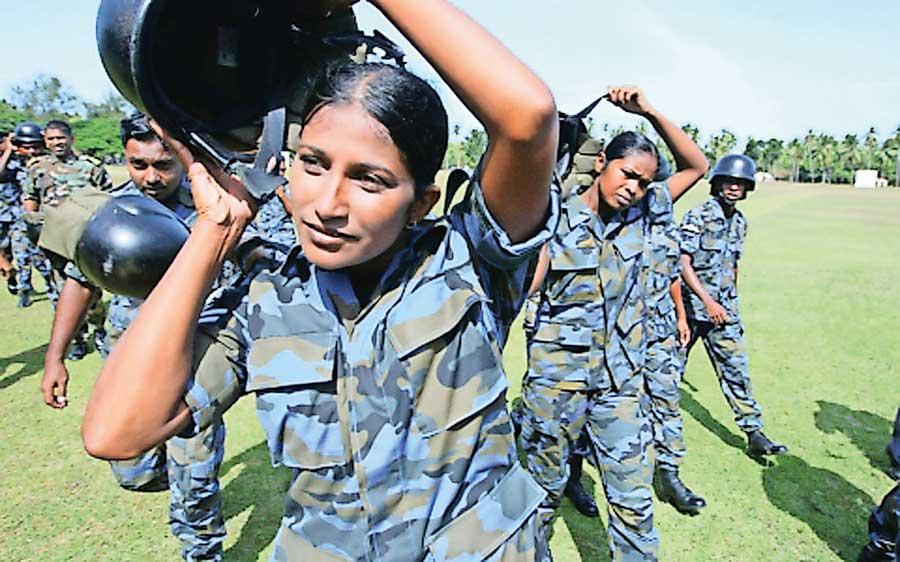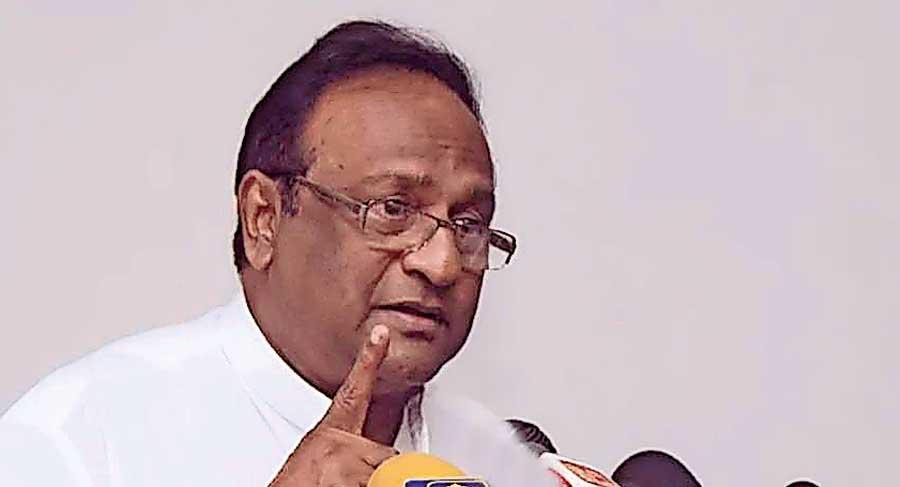20 Jan 2021 - {{hitsCtrl.values.hits}}

As news broke out about Public Security Minister (Rtd) Rear Admiral Sarath Weerasekara’s proposal for military  training for Sri Lankan youth; social media was abuzz with those approving the proposal and those voicing strong objections.
training for Sri Lankan youth; social media was abuzz with those approving the proposal and those voicing strong objections.
He said he would table a proposal in Parliament to make way for military training for citizens above 18 years of age to build a disciplined and law-abiding nation. The minister said he was of the view that Sri Lanka as a country needed discipline. He underscored the fact that there was absolutely no discipline in the country.
“From December 20 last year up to now, more than 100 people had died on the road as a result of violating road rules while more than 180 were reported to have been permanently disabled,” the minister said. “This shows there is no discipline in society. Hence, we must provide military training for young men and women above 18 years of age. This is why I will table this proposal in Parliament. There is no need to fear military training. It is through military training that a person will be able to stand strong, build personality and leadership skills. Military training will ensure that we have law-abiding, disciplined and responsible citizens.”
He said countries which had employed similar strategies had reaped benefits from such programmes. “What I intend proposing is to provide a six-month training course for those above 18 who pass out from schools,” the minister said.
When asked when and how it is going to be implemented, he said it was too early to comment on that and that it was up to Parliament to decide on it. Details as to whether this would be along the lines of compulsory conscription or would provide optional avenues of service remain to be seen.
"Yes, we do need training. But it is not the one that begins at 18 with military training. It is one that begins much earlier through education. Through changing the curricula to one that is inclusive Through encouraging students to participate in positive activities with those from different communities and backgrounds"
Minister Weerasekara who contested from the Sri Lanka Podujana Peramuna (SLPP) at last year’s general election, secured the highest number of preferential votes in Colombo. He was appointed as the Minister of Public Security by President Gotabaya Rajapaksa in November 2020, while he held the post of State Minister of Provincial Councils and Local Government prior to the change in portfolios. The minister is the Convener of the National War Heroes Front as well as a member of the Viyathamaga organisation. He also served as the first Director General of the Civil Defence Department, which administers the Civil Defence Force.
Are we following Germany?
Although the minister’s proposal stirred controversy, he is not the only political figure to be proposing similar measures. Following reports on resurgent right-wing extremism among former members of the German army, the fiery new commissioner of the German armed forces, Eva Högl, started a debate last year, affirming that ending the country’s conscription or mandatory enlistment for state service, was ‘a big mistake’. Compulsory military service in Germany was abolished in 2011 and the army became voluntary around the same time.
The German Defence Minister Annegret Kramp-Karrenbauer however rejected the idea returning to compulsory military service. But a new voluntary service named “Your year for Germany” was announced.
The programme set to be initiated this year requires young Germans who enlist with the voluntary service to receive six months of basic military service training. It will be followed by another six months of reserve service close to their registered addresses.

What about other countries?
With the increasing threats to democracies worldwide even some Western nations who did away with compulsory enlistment are now reconsidering the notion. In Germany, the Defence Minister simply questioned “What keeps our society together? At the moment, the answer is not very much,” she said.
As visible over the past few weeks, threats to European and American national security is also increasing. During the Cold War, a number of Western countries made military service for men mandatory, which is believed to have brought together young men from diverse backgrounds with a common goal of serving one’s country. But without the need for thousands of young men to defend a nation, countries such as France, Germany and Sweden began to do away with conscription in the late nineties.
Other countries meanwhile have adopted a system of Competitive National Service. The Scandinavian model for example develops a highly selective and highly targeted national service aiming to equip the armed forces and other state agencies with specially trained youth. The training would see that the youth receive specialised training in an area that they are selected for. (Somewhat similar to the university admission system in Sri Lanka) Following the one-year training programme, and another year of service, the enlisted remain on reservist status, meaning they can go about their lives unless they choose to join full time.
Is this what we need?
Despite there being many showing support to the move to build a ‘disciplined’ Sri Lanka according to Minister Weerasekara’s proposal, not everyone is convinced. Researcher and Activist Vraie Balthazaar believes that Sri Lanka as a nation is obsessed with discipline.
“Discipline is the basis of how we pick schools for our children. A concept on which political campaigns are created and won,” she said. “I continue to call it a concept, because despite our years of beating generations into submission —literally and metaphorically — we have failed in creating a society that is just.”
Ms. Balthazaar said examples of countries such as Denmark, Sweden and Norway are now being used to argue for forced conscription (if the proposals are mandatory and proposes no alternative services as some countries employ). “But those examples are of countries that have not had a civil war for 30 years. The positives exist in countries that do not have nepotistic dictatorships,” she said and pointed out that there was a longer list of countries that provided its youth military training, but still continue to be violent societies.
“Yes, we do need training. But it is not the one that begins at 18 with military training. It is one that begins much earlier through education. Through changing the curricula to one that is inclusive. Through encouraging students to participate in positive activities with those from different communities and backgrounds,” Ms. Balthazaar said.
Additional reporting by Sheain Fernandopulle
24 Nov 2024 3 hours ago
24 Nov 2024 3 hours ago
24 Nov 2024 4 hours ago
24 Nov 2024 9 hours ago
24 Nov 2024 9 hours ago